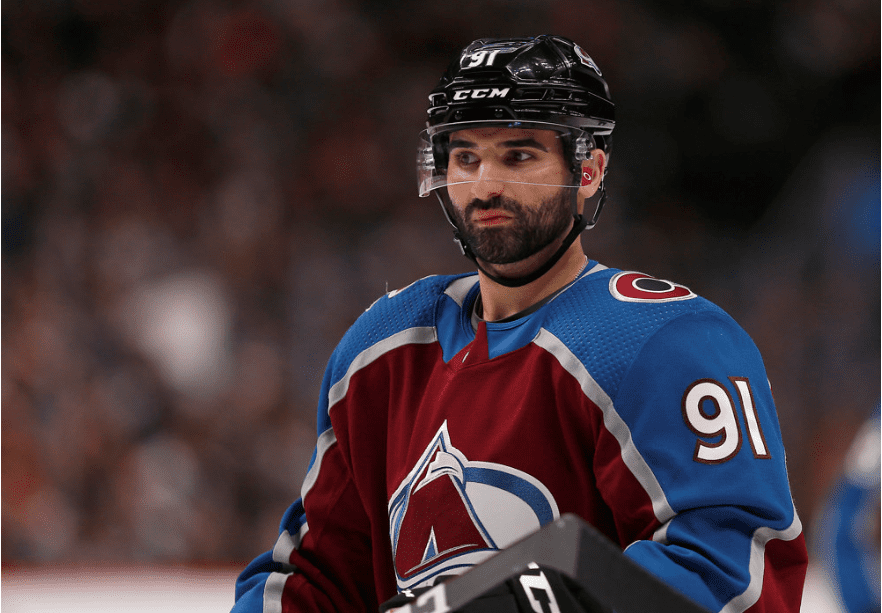Colorado Avalanche
Nazem Kadri Speaks to CHN on officiating and controversial suspension

Six and a half minutes had been played in the third period, and the Colorado Avalanche was protecting a 3-1 lead in Game 2 of a first-round playoff series when St. Louis Blues defenseman Justin Faulk, a dangerous offensive threat, had some time and space with the puck coming down the middle of the Avs’ zone. Faulk was gearing up for a wrist shot when he dipped his head and body down some, to gain better leverage on the shot toward goalie Philipp Grubauer. Nazem Kadri then did what they teach you to do in hockey when an opponent comes into the slot for a dangerous scoring chance: Hit him. Take him off the puck.
So, hit Faulk, Kadri did. Coming from right to left, Kadri kept his elbows in and had his left anchor leg planted firmly on the ice when he delivered a shoulder hit to Faulk. The hit had its desired effect, at least at first. Faulk got a weak shot off on Grubauer, who made an easy save. Two-goal, third-period playoff game lead preserved.
The problem: Kadri’s right shoulder made primary contact with the left side of Faulk’s head. It was an inadvertent, unintentional hit to the head. Kadri meant to just give him a good, hard hit to the body and take the scoring chance away. But when Faulk went down and didn’t get up, Kadri knew he was in some trouble. From the penalty box, he kept looking up at the JumboTron, wanting to see the hit on replay.
When he saw it, he immediately knew he’d probably be suspended for it. But not in his worst, darkest fears did he ever expect the sentence that was handed down from the NHL Department of Player Safety: Eight games. Eight playoff games. They say one playoff game suspension is equal to two, maybe three, regular-season games.
With a “rap sheet” that included two previous playoff suspensions – but with nothing in the past two years, which led Kadri and others with the Avalanche to believe, by the NHL’s own definition of the term, that he would not be considered a “repeat offender” – the severity of the punishment came as a shock to Kadri that he still has a hard time trying to understand.
“There were other instances throughout the playoffs that were very questionable, where the hits were worse than mine, but weren’t even suspendable. It did feel like I was made to be a poster boy, to send a message for the accountability aspect, which I didn’t appreciate much,” Kadri told Colorado Hockey Now on Tuesday, in his first interview since the May 19 incident.
At first, it seemed like the Avalanche might survive the medium-term loss of Kadri. They won the next two games of the series to close out St. Louis, then won the first two games of their next series, against Vegas. But then the losses started. While he was allowed to practice with the team, Kadri couldn’t play in the games. When he got halfway through the suspension, with a 4-0 Avs record in his absence, the 30-year-old, second-line center from London, Ontario, thought for sure he’d still be a player in the postseason, that his and the Avs’ story would ultimately have a happy ending.
As the Avs lost the final four games of the second round to Vegas, it became too unbearable for Kadri to even watch.
“There were a couple of sleepless nights,” Kadri said. “I knew I could have been the X-factor in that series. It was a very strenuous time.”
Kadri appealed the suspension, first to commissioner Gary Bettman, then to a neutral arbitrator, Shyam Das, who had a reputation for leniency toward players in such situations. In his work across various leagues, Das had reduced lengthy suspensions to Milwaukee Brewers slugger Ryan Braun, and also to notorious, NHL repeat-offender Tom Wilson of the Washington Capitals.
While it wasn’t a surprise to the Kadri camp when Bettman upheld the suspension, there was great optimism that Das would shave off a game or two when the case came into his purview. But on the afternoon of Game 5 came the bad news: Das upheld the suspension as well. The earliest Kadri could come back would be a potential Game 7 against the Golden Knights. But the series never got that far.
Again, Kadri acknowledges that, while the hit to the head was unintentional, he would/could have accepted a suspension. But eight games? That’s the part he still can’t figure out – especially when other “head shots” in the playoffs somehow escaped suspension from DoPS director George Parros.
Case in point: On May 21, Washington’s Dimitri Orlov was given nothing for this hit on Boston Bruins defenseman Kevan Miller (which resulted in an injury that prevented Miller from playing the rest of the postseason):
Where was the “accountability” for that hit, Kadri’s team argued with Bettman and, later, Das? And, what constituted “repeat offender” status? The exact wording of the “repeat offender” clause in the collective bargaining agreement was/is poorly worded and confusing to everyone. Technically, repeat offenders don’t have to worry as much in regard to the monetary fines they might receive for offenses outside a two-year window. But when it comes to the length of suspensions, previous offenses can always be taken into account. Or, something like that.
“We tried to,” when Kadri is asked if he understood what the repeat-offender rules were, “but it didn’t make a lot of sense to me. We thought we had a great case. I know those guys have a difficult job. I really do. It’s something I really wouldn’t want in my hands. But, at the end of the day, I feel like, if that’s their job description, there could be some type of consistency. I feel like that might be lacking in some areas. Sometimes, it feels like it’s more the offender and not the offense. I get it, I understand it’s a tough job. But for me to get the equivalent of a 20-game suspension in the regular season, for trying to make a responsible defensive play…?”
“It was not an emotional, hot-headed play,” Kadri said. “Nothing had happened prior. I was trying to make a responsible defensive play. Had I not laid the body and he maybe had got a shot off and got past me and they’d gotten a rebound, then I’d be the guy to blame. So, the only reason why it was forceful is because he’s walking down the slot in a playoff game, and I had to show some urgency in getting over there and to try and prevent him from getting a scoring chance. It was one of those plays where it happened quick. I was just trying to make a responsible defensive play. Of course, I’m not trying to hurt anybody there and put myself out too.”
Kadri had, and still has, the unwavering support of his Avalanche teammates, coaches and management in the wake of the suspension. Coach Jared Bednar believed it was, at most, a 1-3 game suspension. So did GM Joe Sakic, who reportedly was very vocal in his “courtroom defense” of Kadri.

By all accounts, Kadri has been a well-liked and respected member of the Avs’ dressing room since coming over in trade from Toronto. Teammates, younger and older, praised his willingness to help in any way he could, on and off the ice. Unknown to most people, Kadri is a big giver to charitable causes, locally and nationally. You’d never know it, from hanging out with him in the room, that Kadri had any kind of “temper/conduct” problem, as he is always calm and collected with anyone who comes into his transom.
That said, Kadri admits that he can be an “emotional” player on the ice at times. It’s been to his misfortune that sometimes his emotions have translated into hard hits that have injured opponents, in the playoffs. The irony, to that point with the Avs and the May 19 game? Kadri had been a veritable choir boy with his play.
That’s the way he expects it to go with the Avs for this coming season, one in which Kadri is counting the days for when it starts. To say he can’t wait to get to training camp, to start putting this all behind him and getting Avs fans back on his side, would be an understatement.
Kadri is coming up on the final year of a contract that carries a $4.5 million cap hit. He also has a no-trade, no-movement clause, so – contrary to some published reports – he can’t be exposed to Seattle in the July 21 expansion draft unless he waives it. It didn’t sound, on Tuesday, that Kadri had any intention of waiving his NMC to play for an expansion team.
“I’m going to be working extremely hard this summer, to come back, to really make an impact next year,” Kadri said. “I think we’ve got the team and the personnel to put ourselves back in that position. It would just be nice to get back next year, and have some type of normalcy. I feel like that’s when I’m at my best, when I’ve got a chip on my shoulder. I’m just really grateful that everyone with the Avalanche really had my back on this. I think they know the kind of person I am. I’m going to go out there and give it everything I’ve got in return.”











